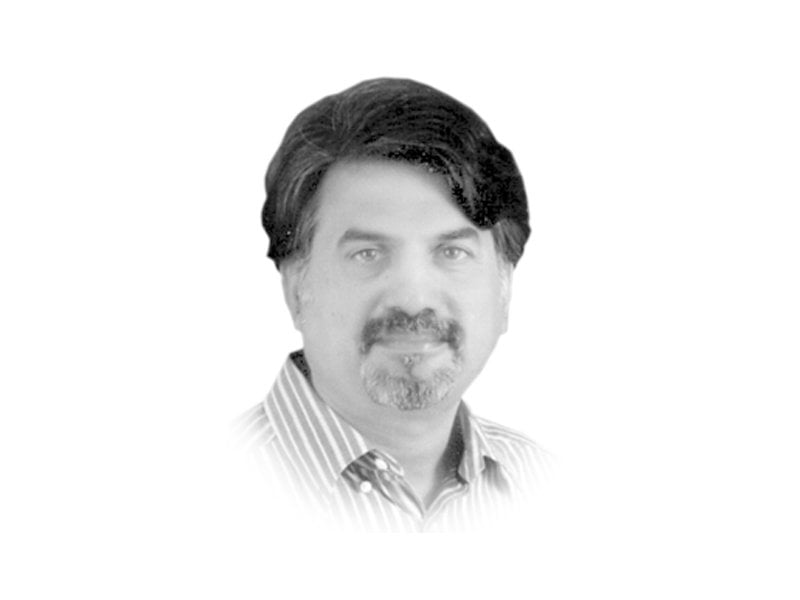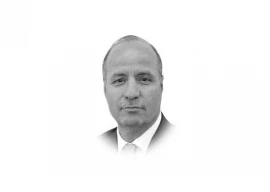
The political reason is too obvious as all politicians want to avoid any ‘scandalous activity’ that may cost them the votes that win them elections and keep them in power. It’s the military reason that has counted the most here and has really stood out. All military academies in the world teach ‘military commanders resolve’ as an outstanding military principle to achieve military successes. No doubt General (retd) Pervez Musharraf and General Kayani were top line generals of our army but they belonged to the same league. Together sharing the military leadership of Pakistan Army for 14 long years, they represented a military mindset that shared and believed in the ‘sacred doctrine of strategic depth’ that possibly was the reason that tied their hands behind their backs as the army continued fighting a ‘stalemated war’ that was being characterised more by ‘firefighting acts’ than any military actions of substance.
General Raheel Sharif, from the outset, vouched to respond to every terrorist act with a military action. Air strikes on the militant hideouts became a norm and it was generally being perceived that the new military commander was pushing his civilian bosses to agree to the initiation of a ‘military operation’ as the most-favoured option. All military commanders know that ‘the success of half of any military operation is reaching there, the other half is its execution’. If anything, the beginning of the military operation suggests that the army may also have reached a conclusion. It will no more guard and protect the ‘ideological frontier’ which it created and sustained and of which the Taliban were an essential part. A frontier, within which the Taliban once trained, nourished, housed and were even protected. If there ever is going to be a ‘responsible end’ to this war, it will come only if the army has finally decided that it no more recognises and accepts the notion of strategic depth and will meet all ‘ideological crusaders’ with a singular treatment.
Addressing the National Assembly, Prime Minister Nawaz Sharif has announced that the “the Zarb-e-Azb operation will not end till all terrorists are eliminated”. The people of Pakistan must own and rally around this mission statement given by the prime minister. Winning this war will not be easy. Nobody is even clear at this stage what really the definition of winning this war is. Surely it can’t only be the successful culmination of tactical operations in the battlefield zone. It has to be something more strategic. Something wider in scope — a single unanimous will of an entire nation, which should, in fact, act as a much ‘wider team’ to execute the prime minister’s given mission statement. In this dreadful irregular war that we fight across the length and breadth of the country, the complete nation will have to stand together to achieve this difficult but not impossible victory.
The real worry that the security establishment faces now is, how to counter the blowback and the retaliatory strikes by the Taliban in the country’s heartland? The Taliban spokesperson has already threatened and reminded the government that ‘our response will be tough’.
The war engulfs the entire country. Pakistan, today, is a war zone and the Taliban will fight this war where it will hurt the government and the army the most. Not in the mountains, gorges and deep valleys of North Waziristan. There these local and foreign militants will lie low or withdraw through the porous border into the neighbouring provinces in Afghanistan.
It’s their vanguards who will retaliate — the likes of the group of terrorists that recently attacked the Karachi airport. These small groups of terrorists harbouring in the urban centres in the country are the real part of the Taliban’s response force. They have the capacity and the capability to create the nightmare that all custodians of safety and security of this country dread and fear. It is against these likely ‘violent and destructive’ militant actions in the urban centres by the death squads of the Taliban, that Pakistan is least prepared. The soft underbelly of Pakistan in the war on terror is its weak ‘second tier security apparatus’.
The example of Karachi — the port city and hub of Pakistan’s business and commercial activity — clearly illustrates why Pakistan’s mega cities may be the choice targets of Taliban’s ‘retaliatory strikes’. A city of over 25 million people, Karachi boosts a police force of only 35,000 men. Most of these men were recruited by the ruling parties on mutually agreed and shared quotas without meeting the required standards of recruitment. Highly unprofessional and corrupt, this is hardly a force that can be relied to put up a defense against the stealth techniques and sneaky and covert operations of the Taliban insurgents. As if their unprofessionalism was not enough — the police force that is highly politicised is mostly involved in serving and protecting the VIPs. According to a rough estimate, over 18,000 men are deployed to protect and serve only the city elite. No wonder the chief minister of Sindh deputed and tasked the military to guard the sensitive installations in the city.
Except the odd IED attacks or small hit-and-run operations, I don’t see any likelihood of the Taliban raising their head in the operational area to meet the challenge that the Pakistan Army has thrown at them. Not under the lurking eyes of the ‘reconnaissance drones’ that the Pakistan Army now flies in the battlefield zone or the cobra helicopters that hover in the skies or even the fighter jets that will now target them day in and day out. The boots on ground will also be deeply relieved and now highly motivated as for them ‘the push has finally come to shove’. The army has enough troops on ground to clear and hold the nerve centres and vital tactical grounds in the operational area. Even if the Afghan Army does not shield its border and prevent the retreating ‘terrorists’ from infiltrating, the Pakistan Army will continue to flush out these terrorists towards the Afghan border.
The procrastination in the decision to launch a military operation by Pakistan’s military and civil elite gave Taliban tremendous military leverage. This all is about to change. The commencement of the military operation is no guarantor of ultimate success against the Taliban, but it surely is the most vital tool now being used by the state from its ‘options tool-kit’ to tip the balance in favour of the state.
Published in The Express Tribune, June 24th, 2014.
Like Opinion & Editorial on Facebook, follow @ETOpEd on Twitter to receive all updates on all our daily pieces.
COMMENTS (6)
Comments are moderated and generally will be posted if they are on-topic and not abusive.
For more information, please see our Comments FAQ


















Although I am not a military or political expert but having consideration for my countrymen I want to bring forward some ideas to neglect retaliation of army operation to concerned authorities, and although talks are going on with afghans to not let their land be used against Pakistan, we all know the real player in Afghanistan is Us who if worked can not only be refrained from supporting miscreants but also is capable to stop other anti Pakistan forces therefore related authorities should use their position and communicate to Us that, NO.1 if they want their support for peaceful and safe vacation of Us armed forces from Afghanistan, NO.2 intimidation of hurdles and troubles on the route of Nato supply NO.3 other Us dependencies must be used, to make them agree to stop letting Afghanistan use against Pakistan.May ALLAH hold our country in his guardianship and blessings ameen
@3rdRockFromTheSun: The fundamentalism towards other is not new. It is foundational and thus cannot be considered as 'rot'. As one set of others are eliminated it is directed to newer sets. Who , if not fundamentalists ensured that Karachi which had 51a% of Hindu population has practically no Hindus left?
But yes if they find that the fundamentalism has not got them good results, they CAN review it and reverse it. For example, Banladesh who separated from India on the same basis as Pakistan i.e. TNT is now secular.
Every single country that matters uses the "good / bad terrorist" policy, including the US and India (BLA, BRA, Jundullah, etc.). Pakistan is singled out for this policy as if it's unique in the world of intelligence operations... please, everyone, grow up. All aggressive intelligence agencies use proxies to achieve their goals. It's not just Pakistan / the ISI. Not saying I defend this policy (that's a different discussion) --- just saying it's widespread and used by many of those who blame us for using it!
Secondly, the US failed to win in Afghanistan because of its lack of understanding of the Afghan mindset and the fact that Pakistan saw to it ;)
Fighting the militants in FATA is only a small part of the overall Pakistani 'war on terror'. In addition to developing the affected areas and ensuring employment opportunities to those in FATA; the bigger battle is stemming and reversing the fundamentalist rot that has set into the Pakistani society and dealing with the TTP supporters hiding in plain sight in all major uran areas. As long as that is not tackled; nothing will change in the long run.
Quote from this article -" Nobody is even clear at this stage what really the definition of winning this war is." unquote.
The Americans could afford to declare victory, and unceremoniously exit Vietnam, and then Iraq, and now Afghanistan ... Pakistan will not have such luxury ...
secondly, when the Americans with all the money and resources failed to win, what makes the Pakistani leadership so sure that they can ... ?1) PM says that Zarb-Azb will not end until all terrorists are elimiated. So I have a few questions - are LeT and JeM included in ghe definition of 'all terrorists'? if yes then the operation will have to spread to Punjab and Pak administered Kashmir. If no, it means that despite all claims to the contrary - the ood terrorist/bad terrorist mindset continues. - are LeJ included in the definition of terrorists? - are TTP who are enscosed in Karachi included in the definition of all terrorists wo. Must be eliminated before operation stops? What about Punjabi Taliban? - if terrorists join the queue of IDPs how will government identify hem! Isn't that what happened during Swat operation where hardly any TTP leader was killed and they just melted away? What is going to be different this time which will ensure that ALL terrorists are actually eliminated? - 6000 odd people are believed to have gone to Afghanistan. How will Pakistan ensure there were no terrorists among those that went there? How will Pakistan ensure that it kills those?
No killing all terrorists simply means getting NWA vacated. Nothing more and nothing less.